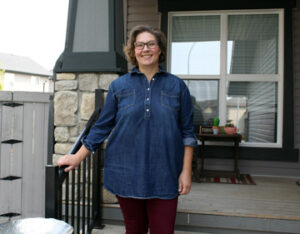Lethbridge woman battling rare autoimmune condition
By Lethbridge Herald on September 18, 2020.
 Lethbridge resident Christa Schaupmeyer is trying to raise awareness of a rare medical condition she has been diagnosed with called Neuomyelitis Optica (NMO), which can have serious long-term health consequences if left untreated. Herald photo by Tim Kalinowski
Lethbridge resident Christa Schaupmeyer is trying to raise awareness of a rare medical condition she has been diagnosed with called Neuomyelitis Optica (NMO), which can have serious long-term health consequences if left untreated. Herald photo by Tim KalinowskiTim Kalinowski
Lethbridge Herald
tkalinowski@lethbridgeherald.com
Lethbridge resident Christa Schaupmeyer is trying to raise awareness of a rare medical condition most doctors have never even heard of, let alone know how to treat.
Schaupmeyer has Neuromyelitis Optica, NMO for short, which only between 1,000 and 3,000 Canadians have. NMO is an autoimmune condition which, Schaupmeyer says, in many instances, gets wrongly diagnosed as multiple sclerosis because of some shared similarities between the two diseases.
“Neuromyelitis Optica is an illness that affects the spinal cord and optic nerves,” Schaupmeyer explains, “and it does that in a way where people might be more familiar with, it being similar to MS. It’s called demyelination where the myelin sheath which covers the nerves is affected. It is often initially misdiagnosed as MS because there are so many similarities.
“In around 2012 the Mayo Clinic developed a blood test for NMO. The reason that is so important is MS and NMO, although they are similar, are often treated very differently. Some of the treatments are the same, but some of the treatments used for MS alone can make NMO worse. So getting a correct diagnosis is very important.”
Schaupmeyer struggled with symptoms of the condition for many years, symptoms which include sight issues, general weakness, bowel and bladder problems, and general fatigue.
Schaupmeyer, who is a psychiatric nurse by training, knew there was something wrong, but it took 10 years of consultations with neurologists and batteries of tests to finally turn up the right diagnosis.
“I had been referred to neurologists,” she says. “I had MRIs. I had bloodwork and lots of other tests, and everything was coming back like there is some generalized inflammation. Neurologists were talking about the possibility of MS. So I had doctors who were on board with my treatment and knew what was going on, but nothing really fit and I was just falling in between some cracks.”
“And then in 2016, I was going to a shift at the hospital and I felt like I had something in my eye that wouldn’t come out,” Schaupmeyer explains. “That was a Friday afternoon, and then by Sunday afternoon I had lost my vision completely in my right eye. It just kind of closed like a curtain from the top down.”
Fortunately, Schaupmeyer received aggressive therapy almost immediately.
“I had episodes of neurological symptoms quite a few years before I was diagnosed,” she says. “The importance of getting the right treatment is to protect against relapse, because in NMO all the damage is done during relapses. And that damage cannot be fixed.
“Once the damage is done, you are dealing with whatever consequences that has on your vision or mobility later. And so the best way to stay healthy is get on a maintenance treatment that will protect you against relapses.
“When you have a relapse you are treated aggressively with steroids or plasmapheresis, which is essentially a blood exchange,” she explains. “The treatment for NMO is to deplete something called B cells, which are causing the damage.”
Schaupmeyer’s NMO has been under control for the past three years, and she only has a few lingering permanent effects. Sadly, her condition has forced her to give up her career as a nurse.
“I function fairly well, but I did have to give up my career,” she confirms. “I left my job as a nurse because I just wasn’t able to keep up and manage anymore physically or mentally. I suffer with fatigue as a result of my condition, and a lot of bowel and bladder problems. I do have some mobility issues and a little bit of trouble with my eye.”
“The first couple of years are really hard, and you grieve a lot of losses,” she adds. “But then you start to normalize and integrate this into your life, and this just becomes your normal.”
Schaupmeyer is grateful to her doctors and everyone who continues to support her. She says it is encouraging to see new research going on all the time, and a new drug to specifically treat NMO called ENSPRYNG has recently been approved by Health Canada.
But the biggest help in adjusting to her new normal, Schaupmeyer says, is reaching out to others who have similar rare conditions. She is grateful to organizations like the Guthy-Jackson Foundation and MS Society for their efforts in that respect.
“I think the big thing is just awareness — awareness for rare disease,” she says when asked why she contacted the Lethbridge Herald to share her story. “I would think a lot of people have had similar experiences where they have had episodes of illness, and they maybe have given up or feel like they are kind of losing their minds because nothing sort of fits. I would just encourage people to keep talking to their doctors and not feel isolated.”
Schaupmeyer also hopes someone perhaps experiencing symptoms like hers might find this article, and would then be able to seek out testing and treatment sooner to prevent the worst side effects of the illness.
“NMO is not hereditary, and it can come out of the blue,” she explains. “And, unfortunately, people relapse while they are on treatment, and that is also just out of the blue. Part of normalizing the experience of living with this is also normalizing living with uncertainty and unpredictability. It is something you don’t have control over.”
For more information on NMO visit the Guthy-Jackson Foundation website at https://guthyjacksonfoundation.org/.
Follow @TimKalHerald on Twitter
-1




